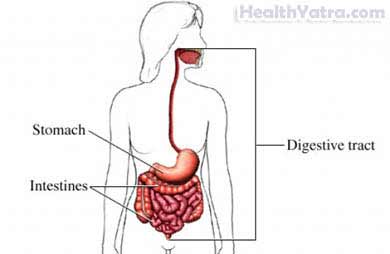Definition
Norovirus infection occurs in the stomach and intestines. It is most often call the stomach flu. Outbreaks often occur in areas with close contact such as:
- Cruise ships
- Restaurants
- Nursing homes
- Hospitals

Causes
These infections are caused by a specific group of viruses. The viruses can spread through:
- Contaminated water supplies such as recreational lakes, swimming pools, wells, and water stored on cruise ships
- Raw or improperly steamed shellfish, especially clams and oysters
- Food and drinks prepared by infected food handlers who either do not wash their hands properly after using the bathroom
- Surfaces, such as a door knob
The viruses can also spread by direct contact with an ill person. This is common in a daycare center or nursing home.
Risk Factors
Any person who ingests the virus is at risk of getting this infection. Older children and adults commonly get this infection.
Even if you have been infected with norovirus in the past, you can become ill again if:
- You are exposed to a different type of norovirus
- Your last illness was more than 24 months ago
Symptoms
If you have any of these do not assume it is due to norovirus. These may be caused by other health conditions. Symptoms may include:
- Nausea
- Vomiting
- Diarrhea
- Abdominal pain
- Headache
- Low-grade fever
- Chills
- Muscle aches
- Tiredness
Symptoms often appear within 24-48 hours of exposure to the virus. Symptoms often last about 24-60 hours.
Diagnosis
Your doctor will ask about your symptoms and medical history. A physical exam will be done.
Your doctor may determine you have a stomach flu from your symptoms. It is rarely necessary to determine the exact virus causing the infection. Stool and blood samples may be taken if your doctor wants to know the exact type of virus causing the problem.
Treatment
A norovirus infection will go away on its own. Medical treatment is often not needed since the illness is often brief and mild.
Most people will recover by resting and drinking plenty of fluids. Oral rehydration solutions are the best option to help replace fluids and electrolytes. These can be found in most drugstores. Severe dehydration may require IV fluids in a hospital but this is a rare complication.
Antibiotics are not effective against viruses. There are no antiviral medicines or vaccines used to fight or prevent this infection.
Prevention
To help reduce your chance of getting or passing noroviruses take the following steps:
- Wash your hands thoroughly with soap and water:
- After using the bathroom
- After changing diapers
- Before preparing or eating food.
- If you are caring for someone who is infected, make sure the person thoroughly washes his or her hands.
- If you are ill or caring for someone who is ill, immediately clean and disinfect contaminated surfaces using bleach cleaner. Remove and wash soiled linens. Use hot water and soap.
- Wash fruits and vegetables.
- Cook oysters and clams before eating them.
- Do not prepare food if you have symptoms. Wait three days after you have recovered before handling food again.
- Throw away contaminated food.
- If you are sick, do not attend work until symptoms have passed.
